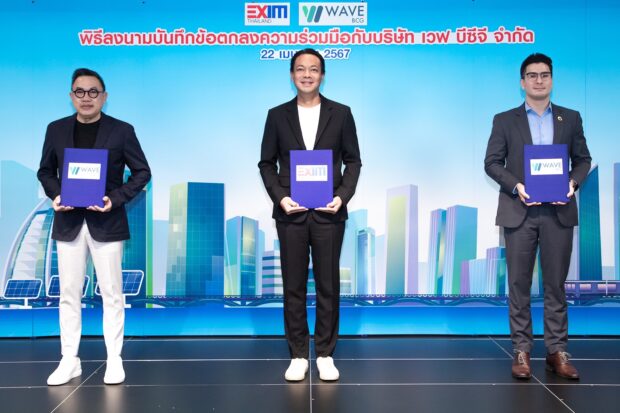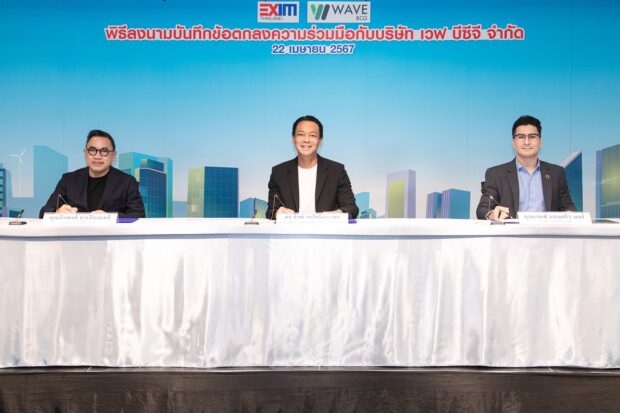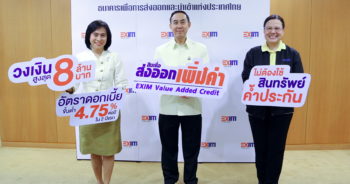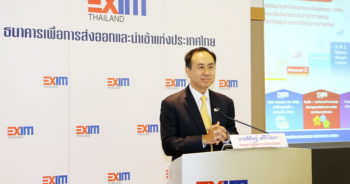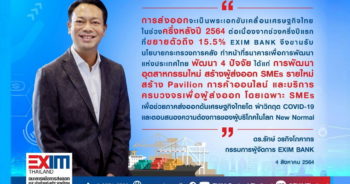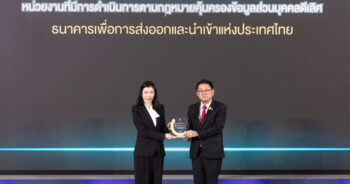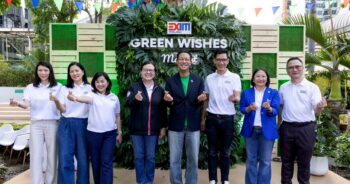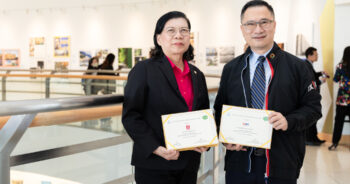ข่าวประชาสัมพันธ์
EXIM BANK x บีซีจี ผลักดันผู้ประกอบการและเกษตรกรไทยลดการปล่อยก๊าซเรือนกระจก ใช้พลังงานสะอาดแก้ปัญหาโลกร้อน เพิ่มขีดความสามารถในการแข่งขันของไทยในเวทีโลก
ดร.รักษ์ วรกิจโภคาทร กรรมการผู้จัดการ ธนาคารเพื่อการส่งออกและนำเข้าแห่งประเทศไทย (EXIM BANK) และนายเจมส์ แอนดริว มอร์ ประธานเจ้าหน้าที่บริหาร บริษัท เวฟ บีซีจี จำกัด ลงนามในบันทึกข้อตกลง ความร่วมมือเพื่อสนับสนุนให้องค์กรต่าง ๆ รวมทั้งภาคธุรกิจของไทย บรรลุเป้าหมายการลดการปล่อยก๊าซเรือนกระจก โดยใช้กลไกใบรับรองการผลิตไฟฟ้าพลังงานหมุนเวียน (Renewable Energy Certificates : RECs) และคาร์บอนเครดิต รวมทั้งส่งเสริมการใช้ทรัพยากรร่วมกันและแบ่งปันความรู้ เพื่อยกระดับประสิทธิภาพองค์กรและการพัฒนาอย่างยั่งยืนในระดับองค์กร ประเทศชาติ และโลกโดยรวม ณ EXWave BCG IM BANK สำนักงานใหญ่ เมื่อวันที่ 22 เมษายน 2567
ความร่วมมือระหว่าง EXIM BANK และบริษัท เวฟ บีซีจี จำกัดในครั้งนี้สอดคล้องกับเป้าหมาย EXIM BANK สู่การเป็น Green Development Bank โดยตอบสนองนโยบายรัฐบาลและเป้าหมายการพัฒนาที่ยั่งยืน (Sustainable Development Goals : SDGs) ขององค์การสหประชาชาติ ขณะที่เวฟ บีซีจี เป็นผู้ให้บริการจัดหาและซื้อขาย RECs ครบวงจรอันดับต้น ๆ ของประเทศไทย มีความสามารถในการจัดหา RECs จากโรงไฟฟ้าพลังงานหมุนเวียนจำนวน 8,000,000 RECs ต่อปี และตั้งเป้าหมายเพิ่ม RECs ใน Portfolio เป็น 15,000,000 RECs ต่อปี เพื่อสนับสนุนให้ผู้ประกอบการไทยบรรลุเป้าหมายในการลดหรือชดเชยการปล่อยก๊าซเรือนกระจกจากการใช้พลังงานและมีขีดความสามารถในการแข่งขันบนเวทีโลกเพิ่มมากขึ้น โดยบริษัทอยู่ระหว่างการพัฒนานวัตกรรมและเทคโนโลยีด้าน Climate Technologies สำหรับโครงการปลูกข้าวนาเปียกสลับแห้ง (Alternative Wetting and Drying : AWD) ช่วยลดการปล่อยก๊าซเรือนกระจกในการปลูกข้าวได้ถึง 45% โดยการบริหารจัดการความสมดุลของปริมาณน้ำใน นาข้าว ลดการใช้น้ำ และเพิ่มผลผลิต เป็นโอกาสในการพัฒนาขีดความสามารถในการแข่งขันและเพิ่มมูลค่าสินค้าเกษตรและอุตสาหกรรมพื้นฐานของประเทศไทยอย่างยั่งยืน
นายเจมส์ กล่าวว่า ปัจจุบันผู้ประกอบการทั่วโลกได้รับการกดดันจากปัญหาโลกร้อน ให้ต้องปรับตัวเพื่อเป็นทางรอด ไม่ใช่ทางเลือก ความร่วมมือระหว่างเวฟ บีซีจี กับ EXIM BANK ในครั้งนี้นับเป็นจุดเริ่มต้นของการแก้ไขปัญหาการปล่อยก๊าซเรือนกระจกที่ยังอยู่ในระดับสูงใน 2 อุตสาหกรรมหลักของไทย ได้แก่ พลังงาน และเกษตร โดยเวฟ บีซีจี ร่วมกับ EXIM BANK จะเดินหน้าผลักดันให้ผู้ประกอบการ รวมทั้งเกษตรกรไทย หันมาใช้ RECs เป็นกลไกในการเพิ่มสัดส่วนพลังงานสะอาดหรือพลังงานหมุนเวียนในประเทศไทย โครงการนำร่องได้แก่ การปลูกข้าวนาเปียกสลับแห้งเพื่อลดการปล่อยก๊าซเรือนกระจก อันจะช่วยเพิ่มขีดความสามารถในการส่งออก สินค้าเกษตรและสร้างความแข็งแกร่งอย่างยั่งยืนให้แก่ภาคเกษตรของไทย
กรรมการผู้จัดการ EXIM BANK กล่าวว่า ความร่วมมือในครั้งนี้เป็นหนึ่งในโครงการบุกเบิกที่ EXIM BANK จับมือกับเวฟ บีซีจี เพื่อสร้างผลลัพธ์ที่เป็นรูปธรรมให้เกิดการซื้อขายคาร์บอนเครดิต กระตุ้นให้เกิดความตระหนักรู้และลงมือทำจริงในการสร้างระบบนิเวศคาร์บอนต่ำ ตั้งแต่ต้นน้ำในภาคเกษตรกรรมและจนถึงอุตสาหกรรมที่เกี่ยวเนื่อง กล่าวได้ว่า ทำให้เกิดการลดก๊าซเรือนกระจก อาทิ ก๊าซมีเทน ตั้งแต่แปลงนาข้าว ไปจนถึงการส่งเสริมให้มีผู้รับซื้อข้าวที่มีก๊าซมีเทนต่ำ ในอนาคต EXIM BANK จะขยายความร่วมมือกับพันธมิตรอื่น ๆ ต่อไปเพื่อขับเคลื่อนการพัฒนาอย่างยั่งยืนตลอด Supply Chain การส่งออกตั้งแต่ต้นน้ำถึงปลายน้ำมากยิ่งขึ้น
ทั้งนี้ EXIM BANK ตั้งเป้าหมายสู่ความเป็นกลางทางคาร์บอน (Carbon Neutrality) ในปี 2573 และลดการปล่อยก๊าซเรือนกระจกสุทธิเป็นศูนย์ (Net Zero Emissions) ในปี 2593 เร็วกว่าเป้าหมายประเทศไทย 20 ปีและ 15 ปีตามลำดับ โดยธนาคารมีเป้าหมายจะเพิ่มสัดส่วนสินเชื่อเพื่อความยั่งยืนให้เป็น 50% ของพอร์ตสินเชื่อทั้งหมดภายในปี 2571 ขณะเดียวกัน เวฟ บีซีจี ตั้งเป้าหมายที่จะส่งเสริมการพัฒนาพลังงานหมุนเวียนในประเทศไทย นำไปสู่การบรรลุเป้าหมายการลดการปล่อยก๊าซเรือนกระจกของประเทศไทยและประชาคมโลก โดยใช้ RECs เป็นหนึ่งในเครื่องมือสำคัญสำหรับส่งเสริมให้เกิดการผลิตและการใช้พลังงานหมุนเวียนมากขึ้น ทั้งโดยตรงและโดยอ้อมในรูปแบบของการชดเชยการปล่อยก๊าซเรือนกระจกขององค์กร ทำให้ทุกภาคส่วน รวมถึงคนตัวเล็กในสังคม สามารถเข้าถึงพลังงานสะอาดได้ และมีส่วนร่วมขับเคลื่อนการพัฒนาอย่างยั่งยืนตั้งแต่ต้นน้ำถึงปลายน้ำไปด้วยกัน
…
EXIM Thailand Joins Forces with Wave BCG to Promote Thai Entrepreneurs and Farmers in Reduction of Greenhouse Gas Emissions and Using Clean Energy Boosting Thailand’s Competitiveness in Global Marketplace
Dr. Rak Vorrakitpokatorn, President of Export-Import Bank of Thailand (EXIM Thailand), and Mr. James Andrew Moore, Chief Executive Officer of Wave BCG Co., Ltd., jointly signed a Memorandum of Understanding (MOU) at EXIM Thailand’s Head Office on April 22, 2024. Under the MOU, both parties will cooperate in supporting organizations, including Thai business entities, to achieve their net zero emission goals through such mechanisms as renewable energy certificates (RECs) and carbon credits, alongside promoting co-use of resources and sharing of knowledge with a view to uplifting their efficacy and sustainable development at organizational, national and global levels.
This cooperation between EXIM Thailand and Wave BCG Co., Ltd. (Wave BCG) aligns with EXIM Thailand’s commitment toward the role of Green Development Bank in response to the government policy and the sustainable development goals (SDGs) of the United Nations.
Wave BCG, as a Thai leading one-stop RECs acquisition and trading service provider holding a backlog of 8,000,000 RECs per year from renewable energy power plants and targeting to reach a portfolio high of 15,000,000 RECs per year, aims to support Thai entrepreneurs’ advancement toward their targets of greenhouse gas (GHG) emission reduction and carbon offsetting, as well as improvement of their competitive advantage on the global stage. As such, the Company has been developing climate innovations and technologies for alternative wetting and drying (AWD) practice in rice farming, which could help reduce GHG emissions from rice systems by as high as 45% through rice farms’ balanced water management and use of less water while increasing farm output, hence conducive to sustainable development of competitiveness and higher value added to farm products and basic industries of the country.
Mr. James said that entrepreneurs worldwide are now compelled by the urgent threat of global warming to adapt their business models, not as an option but a necessity for survival.
The partnership between Wave BCG and EXIM Thailand marks the beginning of concrete actions to address GHG emissions in Thailand’s two key sectors: energy and agriculture. Together, they will spearhead initiatives to encourage Thai entrepreneurs and farmers to adopt RECs as mechanisms to increase Thailand’s use of clean and renewable energy. A prominent project includes the AWD practice in Thailand’s rice farming to reduce GHG emissions, enhancing the competitiveness of Thailand’s agricultural exports and fostering sustainability of the country’s farming sector.
EXIM Thailand’s President highlighted that this partnership with Wave BCG is a cornerstone of their initiatives aimed at producing tangible results in promoting carbon credit trading. This collaboration stimulates awareness and proactively builds Thailand’s business ecosystem towards a low-carbon society, starting from downstream in the agricultural sector to upstream in related industries, leading to a reduction in GHG emissions, notably methane, from rice cultivation, and encourages the purchase of low-methane rice. Looking ahead, EXIM Thailand plans to expand its collaborations with other partners to promote sustainable development across Thailand’s entire export supply chain.
EXIM Thailand has targeted to achieve carbon neutrality by 2030 and net zero emissions by 2050, which are 20 years and 15 years ahead of Thailand’s targets respectively, with the increase in the proportion of sustainability loan portfolio to 50% of the entire portfolio by 2028. Meanwhile, Wave BCG seeks to promote renewable energy development to achieve Thailand and the world’s goals of net zero emissions using RECs as a key tool to boost generation and utilization of renewable energy both directly and indirectly in the form of organizations’ carbon offsetting.
This would enable all sectors, with ‘little people’ in society included, to access clean energy and take part in driving sustainable development upstream to downstream.
